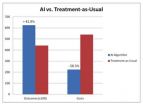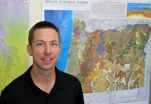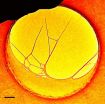(Press-News.org) Just in time for Valentine's Day, the American Chemical Society (ACS), the world's largest scientific society, released a new Bytesize Science video today featuring five chemistry facts that highlight why chocolate, in moderation, may be good for you. The video, produced by the ACS Office of Public Affairs, is available at www.BytesizeScience.com
The video explains how a bar of chocolate contains hundreds of compounds, many with beneficial properties. Among the video's "sweet" facts:
Chocolate may improve your mood, and not just because of its delicious flavor. Chocolate contains a number of chemicals that inhibit the breakdown of the neurotransmitter anandamide — sometimes called "the molecule of bliss" — which can block feelings of pain and depression.
Chocolate contains caffeine and theobromine, stimulants that can provide a burst of energy.
According to an article from the ACS' Journal of Agricultural and Food Chemistry, the naturally occurring polyphenols in cocoa ― the key ingredient in chocolate ― boost levels of HDL, commonly known as the "good cholesterol."
### For more entertaining, informative science videos and podcasts from the ACS Office of Public Affairs, view Prized Science, Spellbound, Science Elements and Global Challenges/Chemistry Solutions.
The American Chemical Society is a nonprofit organization chartered by the U.S. Congress. With more than 163,000 members, ACS is the world's largest scientific society and a global leader in providing access to chemistry-related research through its multiple databases, peer-reviewed journals and scientific conferences. Its main offices are in Washington, D.C., and Columbus, Ohio.
To automatically receive news releases from the American Chemical Society, contact newsroom@acs.org.
Follow us: Twitter Facebook
New American Chemical Society video highlights 5 of chocolate's sweet benefits
2013-02-11
ELSE PRESS RELEASES FROM THIS DATE:
Tree die-off triggered by hotter temperatures
2013-02-11
Washington, DC—A team of scientists, led by researchers at Carnegie's Department of Global Ecology, has determined that the recent widespread die-off of Colorado trembling aspen trees is a direct result of decreased precipitation exacerbated by high summer temperatures. The die-off, triggered by the drought from 2000-2003, is estimated to have affected up to 17% of Colorado aspen forests. In 2002, the drought subjected the trees to the most extreme growing season water stress of the past century.
While often not killing the trees directly, the drought damaged the ability ...
Price for hip replacement highly variable, hard to obtain
2013-02-11
A "secret shopper" study conducted by researchers with University of Iowa Health Care and Iowa City VA Medical Center reveals the difficulty consumers face when attempting to obtain prices for a common surgical procedure.
The study found that 40 percent of top-ranked and 36 percent of non-top-ranked hospitals were unable to provide a price estimate for a total hip replacement procedure. Moreover, among the hospitals that could provide an estimate, the cost quoted for the procedure ranged from $11,100 to $125,798 – a more than ten-fold difference.
While data on hospital ...
Can computers save health care? IU research shows lower costs, better outcomes
2013-02-11
New research from Indiana University has found that machine learning - the same computer science discipline that helped create voice recognition systems, self-driving cars, and credit card fraud detection systems - can drastically improve both the cost and quality of health care in the United States.
Using an artificial intelligence framework combining Markov Decision Processes and Dynamic Decision Networks, IU School of Informatics and Computing researchers Casey Bennett and Kris Hauser show how simulation modeling that understands and predicts the outcomes of treatment ...
Obesity, excess weight gain during pregnancy linked to heavier babies in African-American women
2013-02-11
(Boston) – Epidemiologists at Boston University School of Public Health (BUSPH) have found that pre-pregnancy obesity and excess weight gain during pregnancy in African-American women are associated with an increased risk of giving birth to an abnormally large baby. Macrosomia, which is defined as a newborn weighing more than 4,000 grams at birth (approximately 8.8 pounds), can cause delivery complications such as hemorrhage, infection, the need for a caesarean section, preeclampsia and perinatal mortality. The study, which appears online in the journal Obesity, was conducted ...
Anxiety about relationships may lower immunity, increase vulnerability to illness
2013-02-11
COLUMBUS, Ohio – Concerns and anxieties about one's close relationships appear to function as a chronic stressor that can compromise immunity, according to new research.
In the study, researchers asked married couples to complete questionnaires about their relationships and collected saliva and blood samples to test participants' levels of a key stress-related hormone and numbers of certain immune cells.
The research focused on attachment anxiety. Those who are on the high end of the attachment anxiety spectrum are excessively concerned about being rejected, have a ...
Noisy classroom simulation aids comprehension in hearing-impaired children
2013-02-11
Children with hearing loss struggle to hear in noisy school classrooms, even with the help of hearing aids and other devices to amplify their teacher's voice. Training the brain to filter out background noise and thus understand spoken words could help the academic performance and quality of life for children who struggle to hear, but there's been little evidence that such noise training works in youngsters.
A new report showed about a 50 percent increase in speech comprehension in background noise when children with hearing impairments followed a three-week auditory ...
Large, ancient landslides delivered preferred upstream habitats for coho salmon
2013-02-11
EUGENE, Ore. (Feb. 11, 2013) -- A study of the Umpqua River basin in the Oregon Coast Range helps explain natural processes behind the width of valleys and provides potentially useful details for river restoration efforts designed to improve habitats for coho salmon (Oncorhynchus kisutch).
Coho salmon thrive in broad, flat valleys that contain multiple auxiliary channels to the main river. These valleys formed after large landslides altered the landscape, said study co-author Joshua J. Roering, professor of geological sciences at the University of Oregon. The network ...
Visualizing biological networks in 4-D
2013-02-11
PASADENA, Calif.—Every great structure, from the Empire State Building to the Golden Gate Bridge, depends on specific mechanical properties to remain strong and reliable. Rigidity—a material's stiffness—is of particular importance for maintaining the robust functionality of everything from colossal edifices to the tiniest of nanoscale structures. In biological nanostructures, like DNA networks, it has been difficult to measure this stiffness, which is essential to their properties and functions. But scientists at the California Institute of Technology (Caltech) have recently ...
Old drug may point the way to new treatments for diabetes and obesity
2013-02-11
ANN ARBOR — Researchers at the University of Michigan's Life Sciences Institute have found that amlexanox, an off-patent drug currently prescribed for the treatment of asthma and other uses, also reverses obesity, diabetes and fatty liver in mice.
The findings from the lab of Alan Saltiel, the Mary Sue Coleman director of the Life Sciences Institute, are scheduled to be published online Feb. 10 in the journal Nature Medicine.
"One of the reasons that diets are so ineffective in producing weight loss for some people is that their bodies adjust to the reduced calories ...
New genes for short-sightedness identified
2013-02-11
An international team of scientists led by King's College London has discovered 24 new genes that cause refractive errors and myopia (short-sightedness).
Myopia is a major cause of blindness and visual impairment worldwide, and currently there is no cure. These findings, published today in the journal Nature Genetics, reveal genetic causes of the trait, which could lead to finding better treatments or ways of preventing the condition in the future.
Thirty per cent of Western populations and up to 80 per cent of Asian people suffer from myopia. During visual development ...


